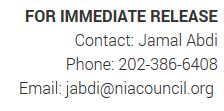Washington, DC – The National Iranian American Council (NIAC) is deeply concerned by reports that the Senate will begin considering new Iran sanctions next week and warns that passage of new Iran sanctions into law would violate the Joint Plan of Action (JPOA) and dramatically reduce, if not eliminate, the prospect of striking a comprehensive nuclear accord.
“For those who want to prevent an Iranian nuclear weapon and avert war, the days and weeks ahead are critical,” said Jamal Abdi, NIAC Policy Director. “If Congress forces through new Iran sanctions legislation over the warnings of the President, our negotiators and the wishes of the American people, they will own the consequences.”
The passage of new sanctions into law would violate the JPOA – ending the significant constraints on Iran’s nuclear program, unraveling multilateral efforts, and putting the U.S. on the path to war.
“Key lawmakers leading this effort have said explicitly that the goal of new sanctions is to kill the talks,” said Abdi. “Those Senators who truly seek a diplomatic solution shouldn’t be fooled, this bill is about ending negotiations and moving to war footing.”
Senator Tom Cotton (R-AK) spoke in support of a sanctions vote yesterday, stating, “The end of these negotiations isn’t an unintended consequence of Congressional action, it is very much an intended consequence.”
“Those legislators intent on blocking a deal, regardless of the disastrous consequences, are racing to pass these sanctions before the US can reach a peaceful deal with Iran and avert a disastrous war,” said Abdi. “At this critical stage of negotiations, new sanctions legislation will only play into the hands of Iranian hardliners who want to block compromise necessary to reach a deal.”
The debate within Iran on whether to offer sufficient nuclear compromises to seal a final deal hinges on perceptions of whether the U.S. will deliver on sanctions relief. This divide has played out in recent days, with President Hassan Rouhani arguing that Iran cannot grow in isolation while suggesting that Iran could scale back its enrichment program to seal a deal. Shortly thereafter, Iran’s Supreme Leader Ali Khamenei pushed back, warning that Iran cannot trust the U.S. when its negotiators say “sanctions cannot be lifted altogether and immediately.”
A similar sanctions debate played out in Congress a year ago with S.1881, a bill that would have forced the U.S. to violate the JPOA by imposing new nuclear-related sanctions on Iran. Despite eventually gaining 60 cosponsors, the dangerous bill never received a vote due to significant opposition from the American people, key Senate leaders, and a veto threat from the President.
###
Back to top